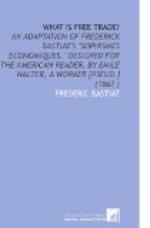There have been men who accused railways of injuring shipping; and it is certainly true that the most perfect means of attaining an object must always limit the use of a less perfect means. But railways can only injure shipping by drawing from it articles of transportation; this they can only do by transporting more cheaply; and they can only transport more cheaply, by diminishing the proportion of the effort employed to the result obtained—for it is in this that cheapness consists. When, therefore, these men lament the suppression of labor in attaining a given result, they maintain the doctrine of Sisyphism. Logically, if they prefer the vessel to the railway, they should also prefer the wagon to the vessel, the pack-saddle to the wagon, and the sack to the pack-saddle: for this is, of all known means of transportation, the one which requires the greatest amount of labor, in proportion to the result obtained.
“Labor constitutes the riches of the people,” say some theorists. This was no elliptical expression, meaning that the “results of labor constitute the riches of the people.” No; these theorists intended to say, that it is the intensity of labor which measures riches; and the proof of this is that from step to step, from restriction to restriction, they forced on the United States (and in so doing believed that they were doing well) to give to the procuring of, for instance, a certain quantity of iron, double the necessary labor. In England, iron was then at $20; in the United States it cost $40. Supposing the day’s work to be worth $2.50, it is evident that the United States could, by barter, procure a ton of iron by eight days’ labor taken from the labor of the nation. Thanks to the restrictive measures of these gentlemen, sixteen days’ work were necessary to procure it, by direct production. Here then we have double labor for an identical result; therefore double riches; and riches, measured not by the result, but by the intensity of labor. Is not this pure and unadulterated Sisyphism?
That there may be nothing equivocal, these gentlemen carry their idea still farther, and on the same principle that we have heard them call the intensity of labor riches, we will find them calling the abundant results of labor and the plenty of everything proper to the satisfying of our wants, poverty. “Everywhere,” they remark, “machinery has pushed aside manual labor; everywhere production is superabundant; everywhere the equilibrium is destroyed between the power of production and that of consumption.” Here then we see that, according to these gentlemen, if the United States was in a critical situation it was because her productions were too abundant; there was too much intelligence, too much efficiency in her national labor. We were too well fed, too well clothed, too well supplied with everything; the rapid production was more than sufficient for our wants. It was necessary to put an end to this calamity, and therefore it became needful to force us, by restrictions, to work more in order to produce less.




